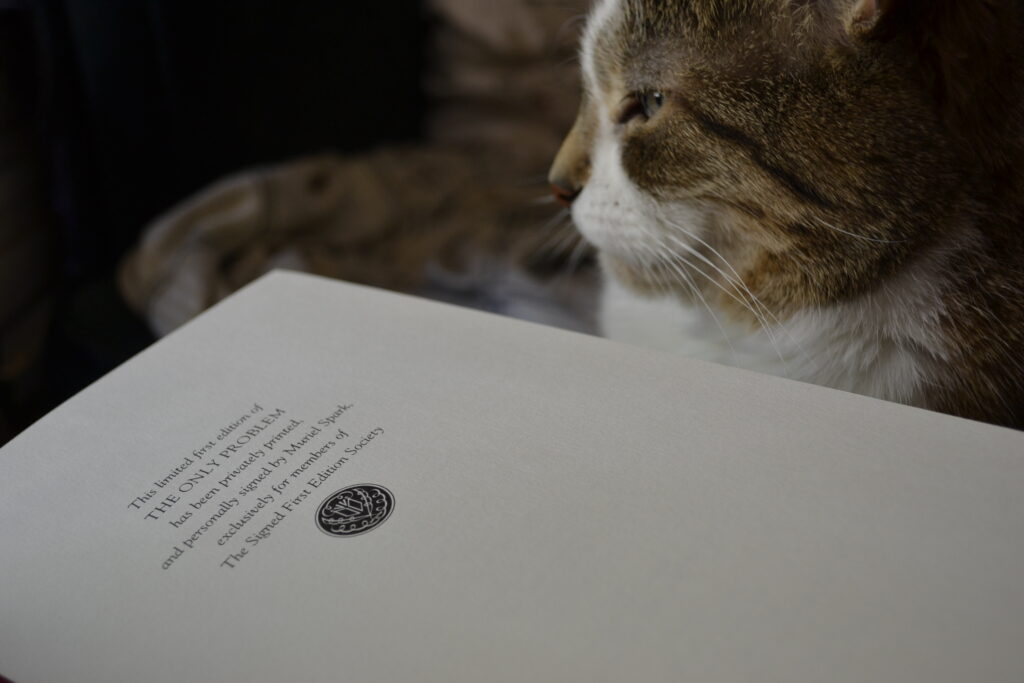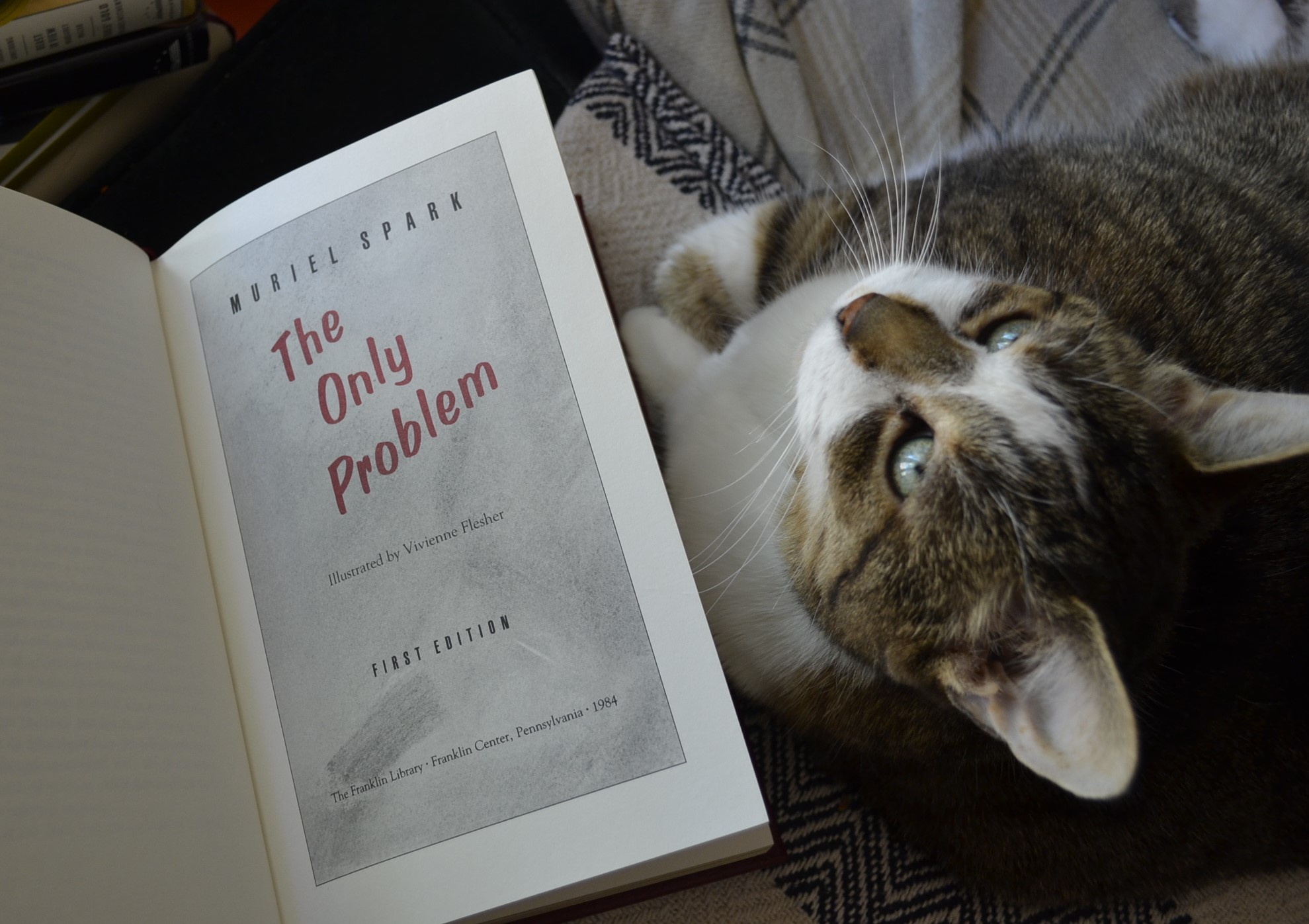Part Two: Another Fancy Book I Didn’t Like
Last week, I reviewed Allen Drury’s Anna Hastings and talked about it being a very fancy book that I didn’t like. Well, at the same time that I acquired Anna Hastings, I also bought a copy of Muriel Spark’s The Only Problem. It was so very pretty, and this one was actually signed by Muriel Spark! An author I usually really like!
While The Only Problem thankfully took a lot less time to read than Anna Hastings, I didn’t like it all that much. It had moments of Spark’s very unique form of wit and repartee that I cannot get enough of, but on the whole, I found it a novel that was just very un-Muriel-Spark. Unfocussed, rambling, and yet short, I would not recommend it as a starter for her body of work. In fact, I wouldn’t really recommend it at all.
Because of the signature, I will hang on to The Only Problem, but I really do wish I had liked it. The fancy edition was bad enough, but there’s something about the additional signature that just makes it so much more of a disappointing read.

When Metaphors Go Too Far
The plot is hard to explain, but I’m going to try my best. Harvey Gotham is insanely rich and has left his wife Effie suddenly when she steals a chocolate bar and blames capitalism whilst on a trip. Edward Jansen, his brother-in-law, comes to convince him to finally grant Effie a divorce and consequently some alimony. Then Edward’s wife, Ruth, ends up coming to see Harvey and leaves her husband for him. Effie? She’s had a baby with another man and has given that baby to Ruth. Then she goes on to possibly head a terrorist organization.

Yes, if you cannot tell by that much abridged summary, this book is certainly a wild ride. But the plot is not the core of the book. That place goes to an extended Job metaphor wherein Gotham casts himself as the long-suffering Job. There are so many discussions of Job in this very short book that it would make your head spin and the metaphor is so heavy-handed that your head must do its spinning while also in the grip of an iron vice.
The ultimate point is that Gotham has made his own suffering, but the metaphor hijacks the story so utterly that you cease to care about the events of the narrative and start trying to piece together just what Spark is saying about Job. That makes for a rather laborious read and a metaphor left dangling in the air. Narrative and metaphor need to be woven together so that each compliments the other and takes it further. Nothing like that is happening here. Instead, there is just too much Job and not much else.

What is Happening?
This is a question I asked many times as I was reading. Things happen and events flow into each other but they don’t seem to do so naturally. And when it comes down to it, no matter how hard I tried I never really got invested in any of the characters or the exploration of the metaphor. Because of that, nothing was dramatic. Nothing was compelling. Nothing was particularly thought provoking. The point seemed to be just in the witty repartee and dry humour. But that can’t carry a book and, ultimately, is part of what made it fall so flat.
The Only Problem was such a disappointment, considering how good of a writer Muriel Spark usually is. But it’s a lesson that not every novel in a large body of work will be a great one. If you want a better book by Spark, there are many to choose from. I really enjoyed The Girls of Slender Means from 1963, but there is also 1959’s Memento Mori, and 1961’s The Ballad of Miss Jean Brodie.

What Was it For?
The point? Well, again, if I was pressed to provide one, I would have to say that it is the mid-life crisis of Gotham, who views himself as Job but ultimately is primarily the author of his own misery. His delusions are just that, delusions that were allowable in 1980s if one was male, straight, white, and rich. Perhaps as a modern reader it is nearly impossible to get beyond these limitations. They have aged very poorly and there is not enough in this novel to reach beyond this very formidable barrier.
Because of this lack of clear purpose, even this very short novel seemed quite long. The ending was doomed to be disappointing because there’s not really one that could have saved the rest of the structure or provided the impact necessary to correct the doldrums and distance that the heavy metaphor caused.
No, this just wasn’t the book for me. Sorry, very fancy edition.

Next Week and Into July
With July approaching, I began to notice that lately I’ve been trying to read through Library of America’s collections of crime novels. Therefore, I thought this would make a fun theme for July’s reviews.
However, by this point I know myself and my reading habits and I know that the moment I plan on finishing a book is the moment when the book somehow makes it to the bottom of my stacks — let alone a whole series of books. So, I make no promises, but hopefully next week I will be taking a month-long dive into some very interesting noir.

